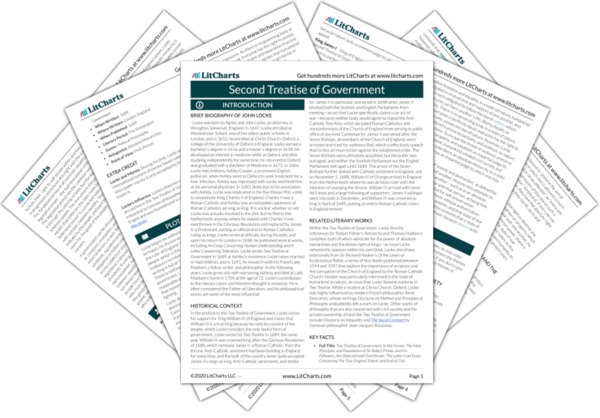In the Second Treatise of Government, nature symbolizes absolute monarchies. In an absolute monarchy, a supreme power—usually a king or a queen—holds complete and total power over all people and property, and that power is not subject to law or dispute. If one is abused, enslaved, or relieved of their property within an absolute monarchy, there is no impartial judge to which they can appeal for relief, and they must instead appeal to the heavens. An absolute monarch does not rule by consent, and when they abuse their power, the force they exert on the people places them into a state of war with one another.
Like an absolute monarchy, there is no common and impartial judge within a state of nature. Thus, there is no common power for one to appeal a perceived wrong. In nature, Locke argues, everyone is completely free and equal; therefore, the right to punish transgressors for violating the law of nature—which states no one can harm another’s life, liberty, health, or possessions—belongs to everyone equally. As there is no one to settle disputes, a state of war continues unchecked, prompting humankind to create civil societies to escape the violence and establish a common judge and laws. The difference between nature and an absolute monarchy, Locke contends, is that one has the right to self-preservation in nature, but no such right exists in an absolute monarchy. Thus, Locke maintains, an absolute monarchy is even worse than a state of nature, and for this reason can never be considered a civil society.
Nature Quotes in Second Treatise of Government
But though this be a state of liberty, yet it is not a state of licence: though man in that state have an uncontrollable liberty to dispose of his person or possessions, yet he has not liberty to destroy himself, or so much as any creature in his possession, but where some nobler use than its bare preservation calls for it. The state of nature has a law of nature to govern it, which obliges every one; and reason, which is that law, teaches all mankind, who will but consult it, that being all equal and independent, no one ought to harm another in his life, health, liberty, or possessions: for men being all the workmanship of one omnipotent, and infinitely wise maker […].
And that all men may be restrained from invading others rights, and from doing hurt to one another, and the law of nature be observed, which willeth the peace and preservation of all mankind, the execution of the law of nature is, in that state, put into every man's hands, whereby every one has a right to punish the transgressors of that law to such a degree, as may hinder its violation […].
I doubt not but it will be objected, that it is unreasonable for men to be judges in their own cases, that self-love will make men partial to themselves and their friends: and on the other side, that ill nature, passion and revenge will carry them too far in punishing others; and hence nothing but confusion and disorder will follow, and that therefore God hath certainly appointed government to restrain the partiality and violence of men. I easily grant, that civil government is the proper remedy for the inconveniencies of the state of nature, which must certainly be great, where men may be judges in their own case, since it is easy to be imagined, that he who was so unjust as to do his brother an injury, will scarce be so just as to condemn himself for it.
Though the earth, and all inferior creatures, be common to all men, yet every man has a property in his own person: this no body has any right to but himself. The labour of his body, and the work of his hands, we may say, are properly his. Whatsoever then he removes out of the state that nature hath provided, and left it in, he hath mixed his labour with, and joined to it something that is his own, and thereby makes it his property. It being by him removed from the common state nature hath placed it in, it hath by this labour something annexed to it, that excludes the common right of other men: for this labour being the unquestionable property of the labourer, no man but he can have a right to what that is once joined to, at least where there is enough, and as good, left in common for others.












